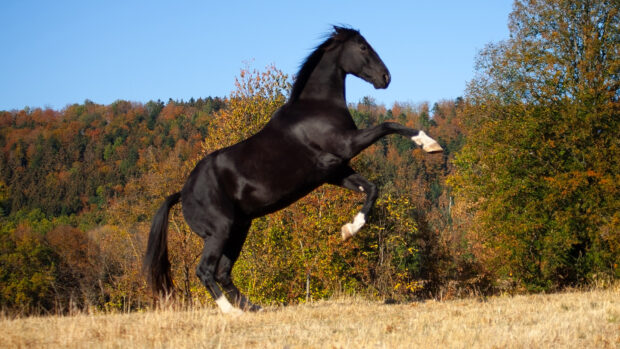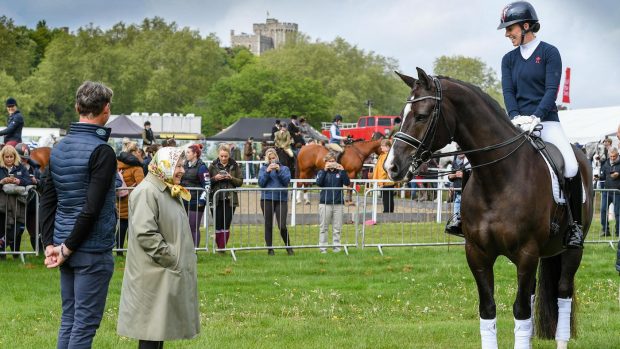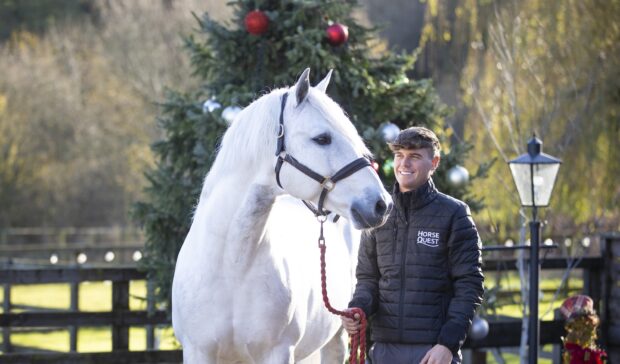EQUINE euthanasia is “absolutely” a treatment option and a positive welfare decision, experts agreed, as they spoke on how and when to make the call.
Vet Suzanne Green and field officer Penny Baker spoke at a World Horse Welfare webinar on end-of-life decisions on 13 April.
Key themes were the importance of having a plan for euthanasia, and ensuring anyone caring for others’ horses knows the owners’ wishes.
World Horse Welfare research and education officer Alana Chapman, who hosted the session, said seven in 10 owners will have to make end-of-life decisions, and a similar number of horses are put down aged seven to 10 as those aged 26 to 30.
“This really is a topic that affects every owner,” she said.
Ms Green explained that “euthanasia” means, literally, “a good death”.
‘I think we’re very privileged to be able to end animals’ suffering,” she said. “It’s never an easy decision but the main message is that it’s absolutely a good welfare option.”
Ms Green said posts on social media about “rescuing horses from slaughter” may not help owners see it as a positive welfare option, adding: “Some see it as failure. To improve animal welfare and people’s perception of euthanasia, we need to remember it’s not failure, it’s a good treatment option, and not just for older horses.”
Ms Green said although horses can live to 30-plus, a long lifespan is not a measure of welfare, and “it’s better to put down at 10 than have a miserable horse for 30 years”. She added that as horses have no concept of time, a four-year-old has no concept that it “should have” had a longer life.
She covered quality of life as the issue to consider in end-of-life decisions; if a horse has poor quality of life owing to age, injury or unmanageable pain, for example, although some situations such as severe colic or leg fractures will “take the decision out of our hands”.
She added that owners’ circumstances may change, maybe through redundancy or having to care for a family member.
“If a horse isn’t viable to be sold, absolutely consider euthanasia,” she said. “Rather than rehome an older horse or one with problems; then you know its welfare is taken care of.”
Other circumstances in which euthanasia could be the best option were injuries that would need months of box rest, for horses who will not cope with this, and “dangerous” horses, as “you don’t owe them your life”.
Ms Green covered assessing quality of life. After an injury, will the horse recover to be a field ornament, and will he be happy in a field, or does the owner need him to return to ridden work?
“There’s no right or wrong answer and you have to take your circumstances into account as well as the horse’s,” she said. “Can you afford the treatment? Plenty can’t but don’t want to put to sleep, and that’s when you can fall into the trap of compromising welfare.”
Ms Green defined good quality of life as a life worth living, free of pain and discomfort, enriching and enjoyable. She said good markers are whether the horse can lie down and get up easily, walk, trot and canter in the field free of pain, and graze. Also, a horse who cannot enjoy more than half the things he used to, such as turnout and hacking, may not have good quality of life. Losing condition despite increased feeding, recurring laminitis or colic, lack of appetite and lameness despite painkillers are also red flags.
Marking on a calendar a horse’s good and bad days can also reveal whether he has more of the latter, in which case euthanasia may be the right option.
“Euthanasia is often the final good thing you can do for your horse,” she said. “It’s a selfless act, because you love them, not because you don’t. Don’t think you’ve failed your horse by making the decision.”
Ms Baker spoke of the support for people considering an end-of-life decision, including from World Horse Welfare, the British Horse Society and the Blue Cross.
In response to a question on preparing other horses for the death of a companion, she said owners could consider arranging another animal to be a companion in advance.
“The decision has been made to let companions go together, even if one has no medical issues, to save it going through a stressful time,” she added. “The person who knows best how a horse will react is its owner.”
Ms Baker added that she does not advise having horses put down in front of their companions, but has “never had a bad experience” when allowing horses to sniff a companion’s body.
“If the horse that’s been put to sleep just disappears and its friend doesn’t know, it will normally call for it,” she said. “We’ve always had a good reaction from letting them see the body, in terms of them accepting it.”
Both speakers agreed that if an owner feels unable to be present when a horse is put down, this is no problem.
“As owners we’re guilty of putting ourselves under such pressure, we feel ‘I’ve got to be there’ and if not, it’s a fault, and I really want to dispel that myth,” Ms Baker said. “When you’re going through that grief, putting yourself under pressure to be there if you can’t deal with it is the worst thing you can do. The horse won’t know; you can say your goodbyes and maybe arrange for someone else to be there. There’s no shame in that.”
Asked how owners would know when is the right time to make the call, Ms Baker said: “I can’t tell you how true the phrase ‘better a week early than a day late’ is.”
There is support available to owners considering end-of-life decisions, including from the British Horse Society, which had a “Friends at the end’ scheme, and on the World Horse Welfare website. Blue Cross also has advice and people to talk to about the decision.
You might also be interested in:

Can a stabled horse truly be happy? Experts discuss the issue

‘The hardest act of love you’ll ever carry out’: advice on dealing with the death of a horse

How the human-horse relationship affects our most important decisions *H&H Plus*

Equine euthanasia: what you really need to know
Saying goodbye to a much-loved horse is never easy, but help yourself be prepared for this sad time with Horse

Subscribe to Horse & Hound magazine today – and enjoy unlimited website access all year round
Horse & Hound magazine, out every Thursday, is packed with all the latest news and reports, as well as interviews, specials, nostalgia, vet and training advice. Find how you can enjoy the magazine delivered to your door every week, plus options to upgrade your subscription to access our online service that brings you breaking news and reports as well as other benefits.




